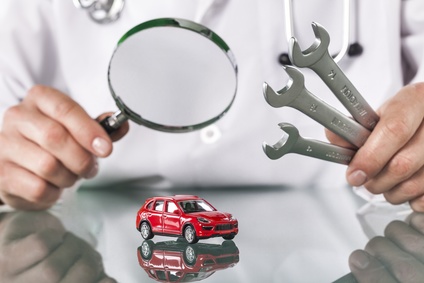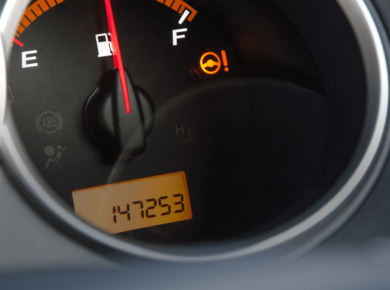When shopping for a used vehicle, you might come across rebuilt title cars at significantly lower prices than those with clean titles. While the savings can be tempting, buying a car with a rebuilt title comes with unique risks and considerations. You might now ask – is a rebuilt title bad? Ultimately, it’s not that simple. In this guide, we’ll help you better understand the rebuilt title definition, how it differs from a salvage title, and how it impacts insurance and financing can help you make an informed decision.
What Is a Rebuilt Title?
A rebuilt vehicle title is issued when a car that was previously declared a total loss by an insurance company has been repaired and inspected by the departments of motor vehicles in its state. Once deemed safe to drive, the title is rebuilt, meaning the car can be legally registered and sold. However, the history of significant damage remains attached to the vehicle.
The difference between salvage and rebuilt title vehicles lies in their condition. A salvage vehicle is one that has been deemed a total loss and has not yet been repaired, whereas a rebuild title car has undergone repairs and passed inspection. If you’re unsure whether a car has a salvage or rebuilt title, checking the vehicle identification number (VIN) with a service like ClearVin can provide clarity.
Pros and Cons of Buying a Car with a Rebuilt Title
Pros
- Lower Purchase Price – Rebuilt cars for sale are typically much cheaper than those with clean titles, making them a budget-friendly option.
- Potential for Quality Repairs – If the repairs were done professionally, a rebuilt title vehicle can be a great deal.
- Availability of Vehicle Condition Reports – Using ClearVin VIN Check can help you verify the extent of previous damage and assess whether the car is worth buying.
Cons
- Limited Insurance Options – Many insurers hesitate to offer full coverage on rebuilt vehicles. Finding the best insurance requires research and working with an insurance agent familiar with these cases.
- Financing Challenges – Some lenders, including credit unions may have stricter requirements or charge higher interest rates.
- Potential for Hidden Damage – Even if a car has been repaired, underlying issues may remain. Reviewing Sales History of ClearVin Report can provide vehicle damage photos and insights into past incidents.
Does a Rebuilt Title Affect Insurance?
Yes, a rebuilt title affects insurance in several ways. Many insurers charge higher rates or limit coverage options on car insurance for rebuilt title vehicles. The rebuilt title insurance cost depends on the insurer, the extent of previous damage, and the car’s overall condition. If you need to insure a vehicle with a salvage history, it’s important to shop around and compare quotes to find the best insurance for rebuilt title vehicles.
For more details on how title branding impacts insurance, refer to the official NMVTIS brand codes.
How to Assess a Rebuilt Title Vehicle
Before purchasing a rebuilt salvage title car, take these steps to ensure you’re making a sound investment:
- Check the Vehicle History – Request a VIN check report and review sales history, accident records, and damage photos.
- Inspect the Car in Person – Look for signs of frame damage, inconsistent paint, or other red flags that indicate poor repairs.
- Get a Professional Inspection – A trusted mechanic can assess whether the vehicle is truly safe to drive.
- Verify the Rebuilt Title Issued Date – Ensure the car has passed all required inspections and is properly documented.
- Use a Rebuilt Title Value Calculator – Comparing the price of a rebuild title car to Kelley Blue Book estimates can help determine if it’s a good deal.
Should I Buy a Vehicle with a Rebuild Car Title?
The decision to buy a used car with a rebuilt title depends on your budget, insurance options, and willingness to accept potential risks. While these vehicles can be a great value, they may not always be the best choice for buyers who need reliable long-term transportation with minimal complications or a need to repair the vehicle.
If you’re still uncertain, reviewing ClearVin’s previous article, ‘Why Is It Necessary to Check VIN History Before Purchasing a Used Car?’, can provide additional insights into the importance of checking a vehicle’s past before purchasing.
Rebuilt Title vs Salvage Title: Key Differences
One of the most common questions buyers ask is, “what is a rebuilt title on a car, and how does it compare to a salvage title?” A salvage title is issued when a vehicle has been declared a total loss by an insurance company due to an accident, flood, fire, or other severe damage. At this stage, the vehicle with a salvage title is not legally drivable until repairs have been made and it has passed an inspection.
In contrast, a reclaimed title car that has undergone repairs and passed safety inspections will receive a rebuilt title. This signifies that it can legally return to the road. However, even though the title is rebuilt, the vehicle’s history as a previously damaged car can still affect its value, insurability, and overall desirability.
Rebuilt Title Insurance and Financing Considerations
One of the biggest concerns when considering a car issued a rebuilt title is insurance and financing. Many buyers wonder, “does a rebuilt title affect insurance?” The answer is yes – insuring a car with a rebuilt salvage title can be more expensive than a car with a clean title, and some providers may only offer liability coverage rather than full coverage. Finding rebuilt title insurance may require working with specialized insurers willing to cover these vehicles.
Financing can also be tricky. Some banks and credit unions hesitate to issue loans for vehicles with a rebuilt title due to their diminished resale value and increased risk. However, credit unions that finance rebuilt titles may offer better rates than traditional banks, making it worth researching your options.
Conclusion
Buying a rebuilt title car requires thorough research and careful evaluation. From checking the vehicle history to understanding how a rebuilt title affects financing and insurance, it’s essential to weigh the pros and cons. If you decide to buy a rebuilt title car, using ClearVin’s Vehicle Condition Rating can help you make an informed choice. It appraises the vehicle based on several criteria, including age, depreciation, and past damages, to provide a clear estimation of the vehicle’s value with different titles.
By following these steps, you can determine whether a rebuilt title vehicle is the right choice for you or if it’s better to explore other options. Always consider the long-term implications of buying rebuilt title cars for sale, including insurance costs, potential repairs, and resale value, before making your final decision.









